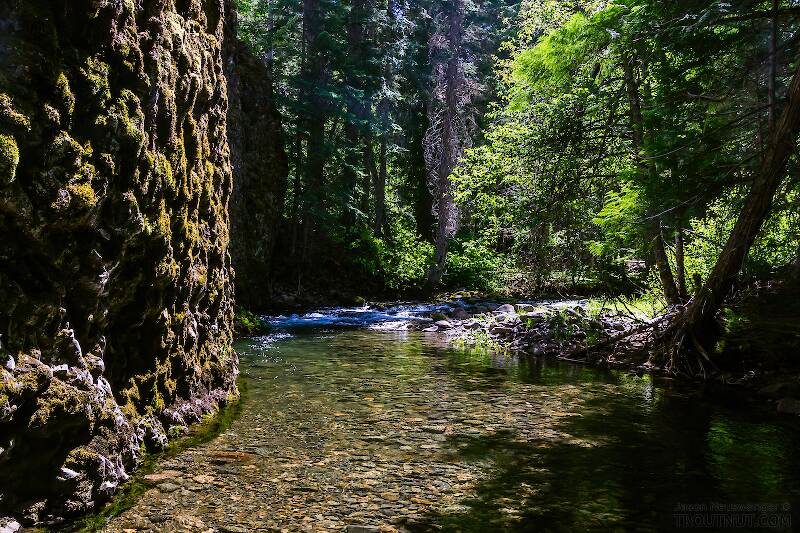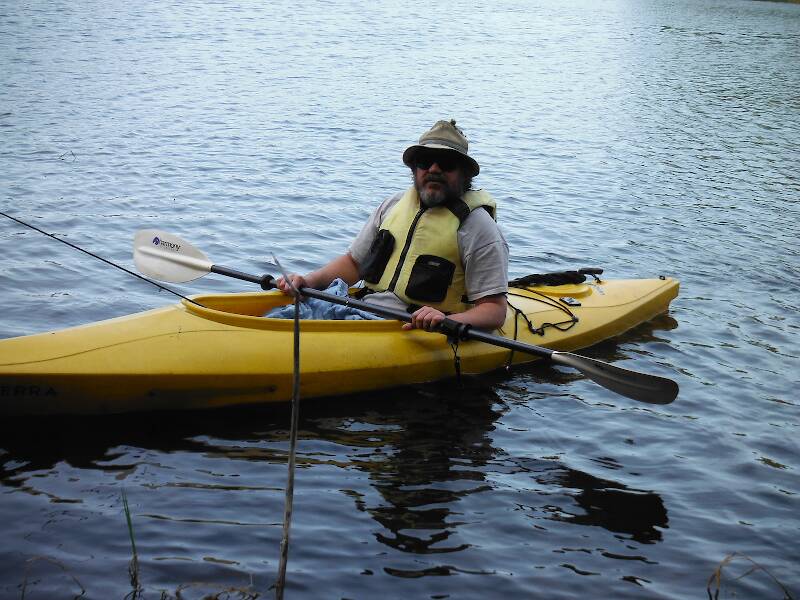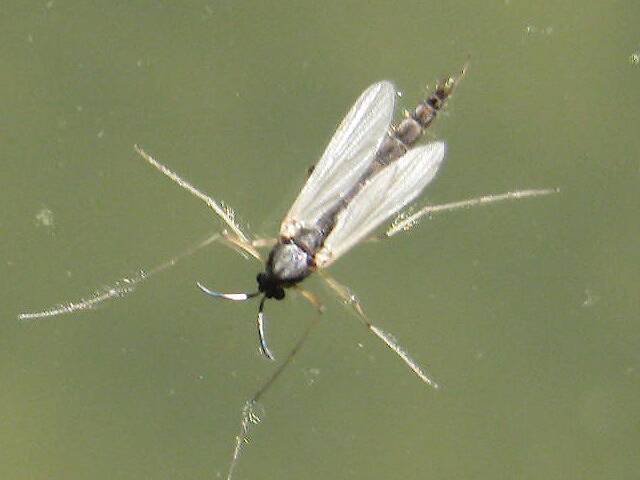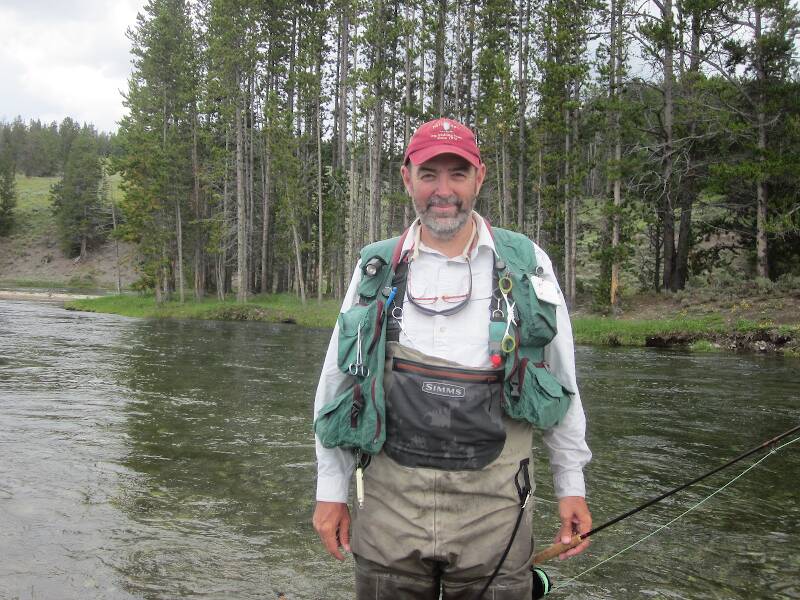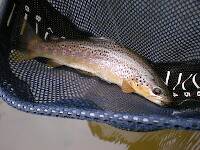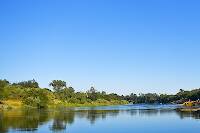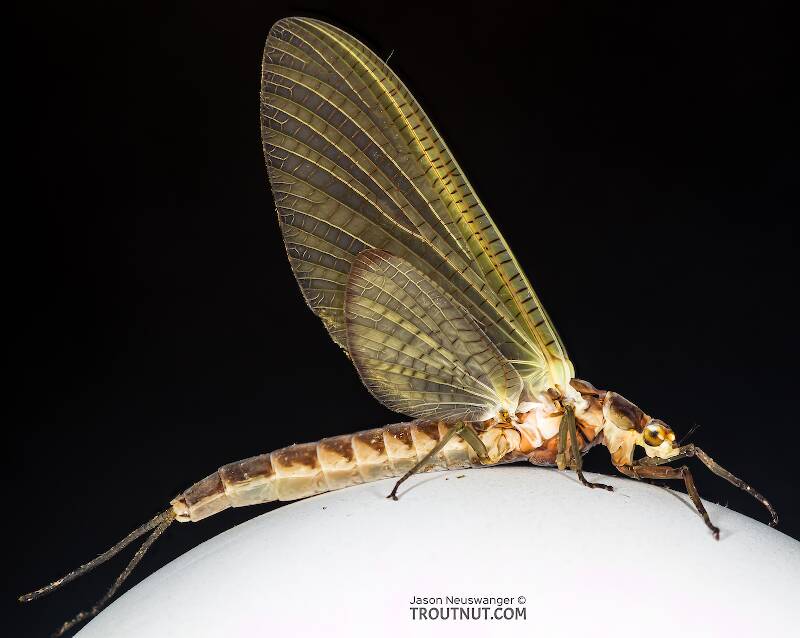
Hex Mayflies
Hexagenia limbata
The famous nocturnal Hex hatch of the Midwest (and a few other lucky locations) stirs to the surface mythically large brown trout that only touch streamers for the rest of the year.
Featured on the forum
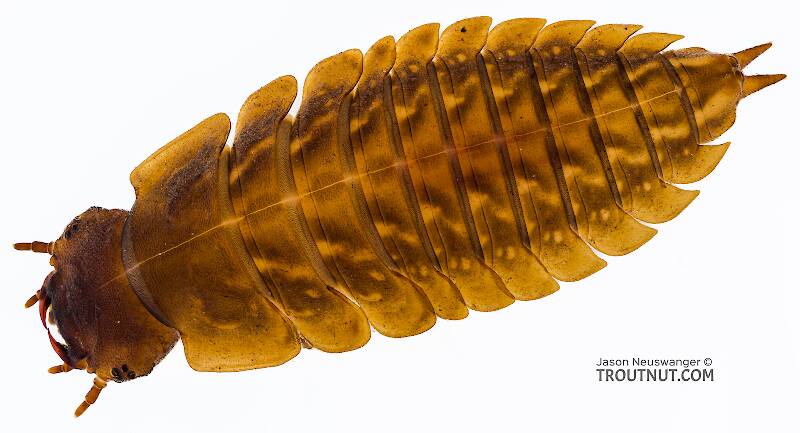
This is the first of it's family I've seen, collected from a tiny, fishless stream in the Cascades. The three species of this genus all live in the Northwest and are predators that primarily eat stonefly nymphs Merritt R.W., Cummins, K.W., and Berg, M.B. (2019).

Troutnut is a project started in 2003 by salmonid ecologist Jason "Troutnut" Neuswanger to help anglers and
fly tyers unabashedly embrace the entomological side of the sport. Learn more about Troutnut or
support the project for an enhanced experience here.
Troutnut on Sep 8, 2009September 8th, 2009, 1:43 pm EDT
Last week I gave a presentation at the national meeting of the American Fisheries Society in Nashville. I was presenting some methods I helped develop for measuring fish lengths/positions in 3D, and demonstrating some simple analyses we can do with that.
I've got some fish & digital fish videos from the presentation on YouTube. They're described/embedded in this post on our project blog:
http://www.chenakings.org/2009/09/02/3d-video-materials-from-jason-neuswangers-afs-presentation
I've got some fish & digital fish videos from the presentation on YouTube. They're described/embedded in this post on our project blog:
http://www.chenakings.org/2009/09/02/3d-video-materials-from-jason-neuswangers-afs-presentation
Jason Neuswanger, Ph.D.
Troutnut and salmonid ecologist
Troutnut and salmonid ecologist
Jmd123 on Sep 8, 2009September 8th, 2009, 2:48 pm EDT
Aha, you ARE doing fisheries! I suspected as much...
Jonathon
Jonathon
No matter how big the one you just caught is, there's always a bigger one out there somewhere...
Shawnny3 on Sep 9, 2009September 9th, 2009, 1:01 pm EDT
Interesting, Jason. I saw a feeding behavior last season in a trout that I'd never seen before - perhaps you have. There were a lot of trout in a long, slow run, but none in obvious proximity to the fish I noticed. It was probably on the large side of average, and it did the following: Swim upstream in the fastest water (still not very fast water) for about 10 feet, then turn and circle back downstream about 10 feet, then swim up through the fastest water again about 10 feet, then circle back down again, over and over. I couldn't tell if it was feeding at any points in its cycling, but it looked like it was not. Still, the behavior was so hypnotically repetitive, and the cycle so much bigger than I'm used to seeing for a feeding trout, I was left wondering just what the fish was accomplishing. Perhaps it was exercising a type of territoriality in a highly populated run, staking its claim to a prime feeding position? I don't know, but I thought I'd mention it and see if you or anyone else has observed similar behavior and has an explanation.
-Shawn
-Shawn
Jewelry-Quality Artistic Salmon Flies, by Shawn Davis
www.davisflydesigns.com
www.davisflydesigns.com
Falsifly on Sep 10, 2009September 10th, 2009, 5:31 am EDT
Shawn, I believe this behavior is quite common. It was first pointed out to me many years ago by a guide. He had spotted a large Rainbow working along the bank and called me over. Positioned down stream from the fish he told me to watch how the fish was working. The fish would slowly work upstream, along the bank, then move out into the current and circle back to the same starting point and repeat the cycle. That fish was hooked, but lost in a reel-screaming run. I have since observed these behaviors untold times, while the fish were feeding; most notably in slower water were it’s easily seen. Do the fish display this type of behavior as a territorial defense? I don’t know. I would ask: would a fish expend that energy without the benefit of feeding? I suppose one could posit that this type of behavior is an act of defending a feeding area while feeding. But then again, I have seen large numbers of fish feeding simultaneously in small areas with no display of aggression. I think it may be a question of how much food is available and whether or not the fish find it necessary to forage. If that’s the case could it not be possible that the act of foraging a specific area, which is defined by the boundary of the circuit, is a display to smaller fish to keep out? Maybe others will weigh in.
Falsifly
When asked what I just caught that monster on I showed him. He put on his magnifiers and said, "I can't believe they can see that."
When asked what I just caught that monster on I showed him. He put on his magnifiers and said, "I can't believe they can see that."
Jmd123 on Sep 10, 2009September 10th, 2009, 7:11 am EDT
This may be somewhat unrelated, but I have seen largemouth bass exhibit this same type of behavior during their spawning season, although in still waters. Despite the different timing of this type of behavior, I would tend to believe that this is indeed territoriality.
That's my 2 cents anyway...
Jonathon
P.S. Shawn, what time of the year did you observe this behavior, and what species was it?
That's my 2 cents anyway...
Jonathon
P.S. Shawn, what time of the year did you observe this behavior, and what species was it?
No matter how big the one you just caught is, there's always a bigger one out there somewhere...
Oldredbarn on Sep 10, 2009September 10th, 2009, 7:17 am EDT
Shawn,
Just before Labor Day of 2004 I took a horseback trip up to the Third Meadow of Slough Creek in Yellowstone. It was provided through Blue Ribbon Flies in West Yellowstone.
On the last morning Steve Hoovler from BRF and I got up early and headed to the river. The river snakes through the valley and the actual water level is well below the ground level. What I mean is, if you are standing in the gravel area by the river and stood up the top of the bank is about chest high. Years and years of the river eroding the ground, especially during the spring melt, has really cut away in to the ground.
At each bend its like the gravel gently slopes off in to the hole in the bend of the river. It is almost like a gravel beach and is quite shallow until it finally gets to the deeper part of the river.
Steve and I squatted down and watched a nice Cutthroat slowly swim from up out of the hole and cover the shallows picking up nymphs along the way. When it made it to the shallows, its dorsal fin actually breaking the water, it would slide over to the faster deeper part and let the river current carry it back to the bottom of the run. It would then start the whole trip over again.
We wished that we had had a movie camera. You could watch the whole thing as clear as day. Early in the morning before the wind picked up the water surface was as smooth as glass.
I took out an ant pattern and tied it on. Steve thought it would be a good idea to "dirty" it up a bit and we smeared it around a little in the dirt.
The fish started back up the course and I made my cast, still squatting down. The fish moved to my ant and started to suck it in. Steve was standing next to me yakking on my arm beside himself with excitment. I just, ever so slightly, turned my wrist to set the hook and the fly popped out of it's mouth landing about six inches away. The fish then turned to the fly and took it again! It was a 17" Cutt!
It was one of the most exciting fish I ever caught because we watched the whole drama right in front of our eyes. Now that I think about it he was supposed to send me a photo and never got around to it...Oh well! It's lodged in my brain for sure! Steve wrote about it in the diary they keep on the web page for BRF's.
It seems that these sort of things are noticed more out west. Bigger fish are the norm in a more open stream. In Michigan the big fish hang a quarter of an inch from structure or an under-cut bank and seldom seem to move from this feeding spot. Guys who have grown up fly fishing for trout in Michigan have paid their dues when it comes to catching larger trout. We head out west and seem to have a field day because our targets are more out in the open. The Mid-West is a great "masters-class" in fly fishing and prepares you well for fishing elsewhere.
Take Care!
Spence
Just before Labor Day of 2004 I took a horseback trip up to the Third Meadow of Slough Creek in Yellowstone. It was provided through Blue Ribbon Flies in West Yellowstone.
On the last morning Steve Hoovler from BRF and I got up early and headed to the river. The river snakes through the valley and the actual water level is well below the ground level. What I mean is, if you are standing in the gravel area by the river and stood up the top of the bank is about chest high. Years and years of the river eroding the ground, especially during the spring melt, has really cut away in to the ground.
At each bend its like the gravel gently slopes off in to the hole in the bend of the river. It is almost like a gravel beach and is quite shallow until it finally gets to the deeper part of the river.
Steve and I squatted down and watched a nice Cutthroat slowly swim from up out of the hole and cover the shallows picking up nymphs along the way. When it made it to the shallows, its dorsal fin actually breaking the water, it would slide over to the faster deeper part and let the river current carry it back to the bottom of the run. It would then start the whole trip over again.
We wished that we had had a movie camera. You could watch the whole thing as clear as day. Early in the morning before the wind picked up the water surface was as smooth as glass.
I took out an ant pattern and tied it on. Steve thought it would be a good idea to "dirty" it up a bit and we smeared it around a little in the dirt.
The fish started back up the course and I made my cast, still squatting down. The fish moved to my ant and started to suck it in. Steve was standing next to me yakking on my arm beside himself with excitment. I just, ever so slightly, turned my wrist to set the hook and the fly popped out of it's mouth landing about six inches away. The fish then turned to the fly and took it again! It was a 17" Cutt!
It was one of the most exciting fish I ever caught because we watched the whole drama right in front of our eyes. Now that I think about it he was supposed to send me a photo and never got around to it...Oh well! It's lodged in my brain for sure! Steve wrote about it in the diary they keep on the web page for BRF's.
It seems that these sort of things are noticed more out west. Bigger fish are the norm in a more open stream. In Michigan the big fish hang a quarter of an inch from structure or an under-cut bank and seldom seem to move from this feeding spot. Guys who have grown up fly fishing for trout in Michigan have paid their dues when it comes to catching larger trout. We head out west and seem to have a field day because our targets are more out in the open. The Mid-West is a great "masters-class" in fly fishing and prepares you well for fishing elsewhere.
Take Care!
Spence
"Even when my best efforts fail it's a satisfying challenge, and that, after all, is the essence of fly fishing." -Chauncy Lively
"Envy not the man who lives beside the river, but the man the river flows through." Joseph T Heywood
"Envy not the man who lives beside the river, but the man the river flows through." Joseph T Heywood
Shawnny3 on Sep 10, 2009September 10th, 2009, 1:11 pm EDT
Thanks for the replies, guys. The fish, Jonathon, was a brown, and it was probably early May, but I can't remember for sure. There was a decent hatch going on (BWOs or blue quills, I think), but I'm pretty sure the fish was not feeding while engaging in this behavior.
-Shawn
-Shawn
Jewelry-Quality Artistic Salmon Flies, by Shawn Davis
www.davisflydesigns.com
www.davisflydesigns.com
Quick Reply
Related Discussions
Topic
Replies
Last Reply
2
Apr 25, 2016
by Afishinado
by Afishinado
1
Nov 18, 2007
by Martinlf
by Martinlf

